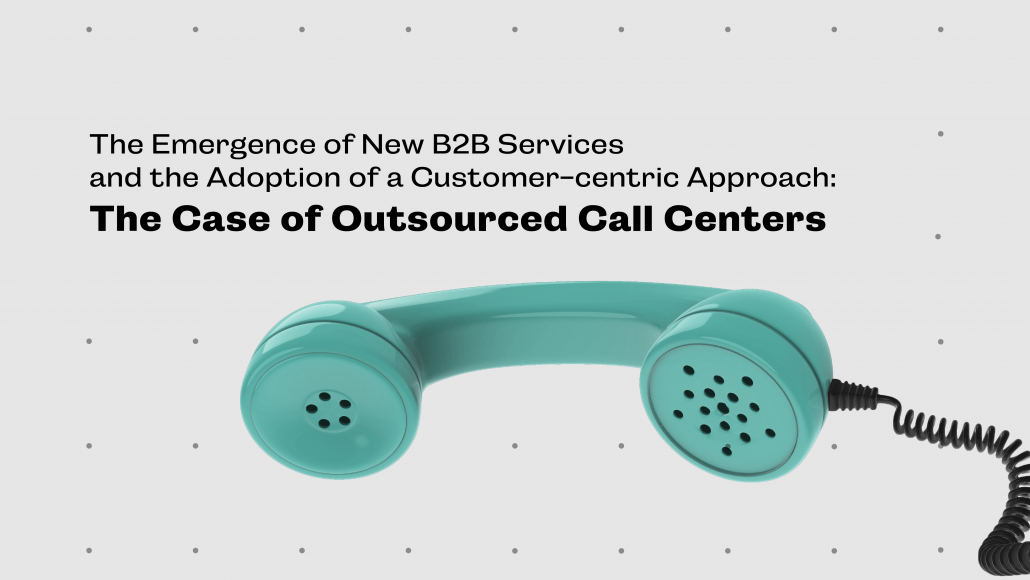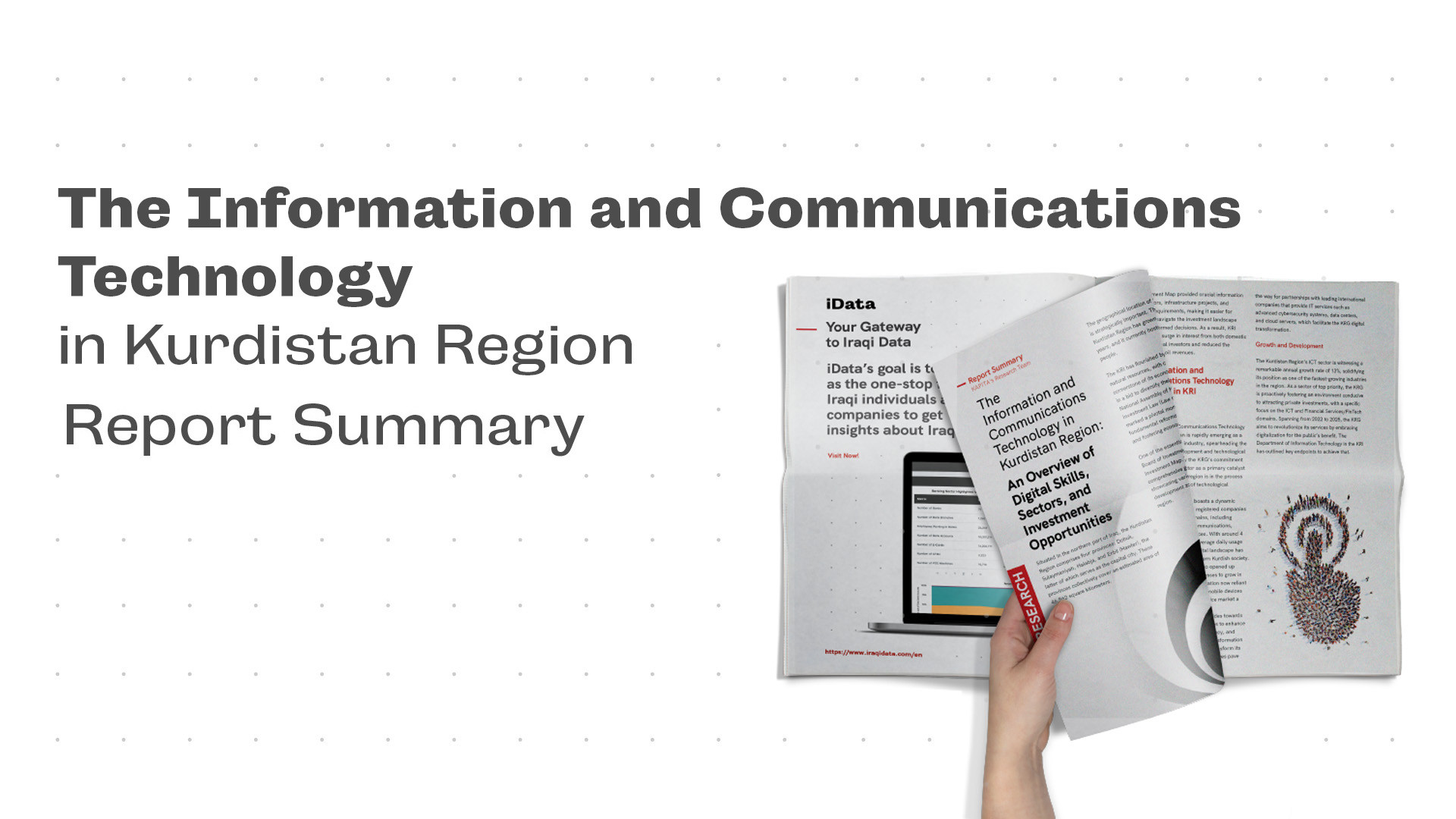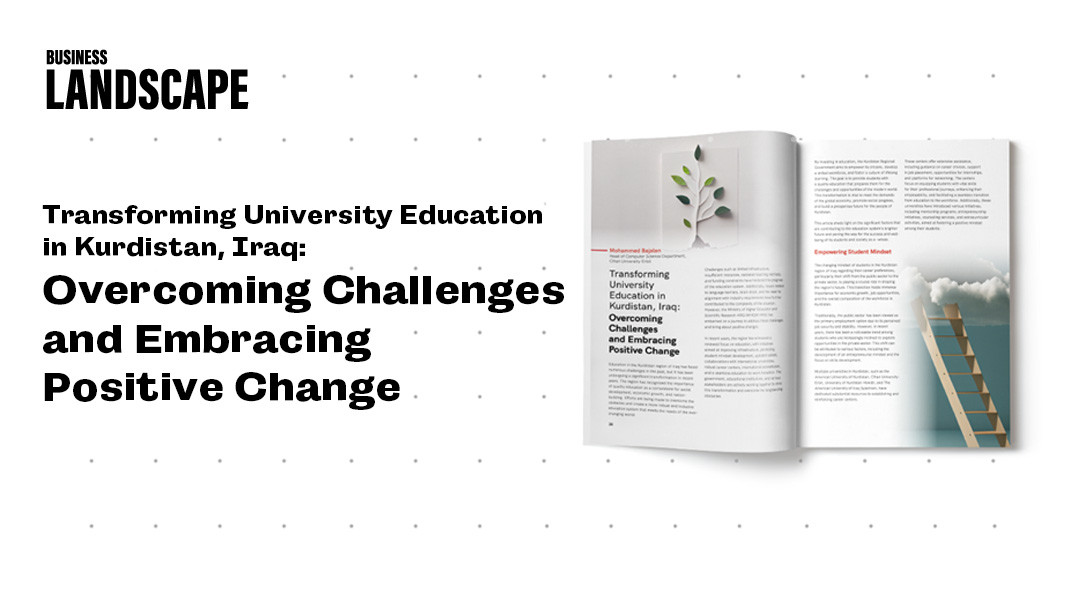The Emergence of New B2B Services and the Adoption of a Customer-centric Approach: The Case of Outsourced Call Centers
Mohammed Jamal
Editor-In-Chief, Business LANDSCAPE Magazine
There is considerable debate about the maturity of the Iraqi private sector, with many asserting that it is still nascent and merely taking its initial steps toward contributing significantly to the country's economy. Whether or not you concur with this view, the consensus is that Iraq's private enterprises are yet to fully evolve into established institutions. However, similar to how ocean waves shape sand castles, digitalization is steadily transforming Iraqi private businesses.
The reach of this digitalization stretches across a vast range of enterprises, from expansive hypermarkets to modest brick-and-mortar stores and from telecommunication providers to ride-hailing apps. Today, nearly every Iraqi business has incorporated some form of online communication with its customers. Although many may lack a sophisticated website, their interaction levels on Facebook pages or Instagram profiles are impressively high, often surpassing those of some global brands.
The Iraqi market is undergoing a revolution, with a thriving appreciation for top-tier service. The shift towards customer-centric experiences is a new and promising step in the evolution of the country's private sector. This growing trend of highly interactive business social media channels is merely one example of this shift.
Such advancements in the market approach employed by Iraqi businesses are creating a significant demand for B2B services. These services are crucial in helping companies design and implement strategies to provide their customers with the products and services they desire. The rapid formation of micro, small, and medium-sized social media management agencies is indicative of this trend, with many being overwhelmed by the demand for enhanced service. In a market where design services were recently seen as a complimentary add-on to printing orders, managers are now seeking to employ in-house designers and considering contracting agencies to manage their design and social media needs.
While the demand for digital marketing and design services is clear, one could argue that the transformation in the market approach adopted by Iraqi businesses will inevitably increase the need for more B2B services. These services could span market research, management consulting, recruitment, employee training, logistics, public relations, communications, infrastructure, sales, and aftersales.
A prime example of evolving needs in the move towards a customer-centric approach is the demand for effective customer service units, often delivered through call centers. Following the establishment of telecommunications companies post-2003, call centers became a new experience for many Iraqis. As years passed, more businesses established their own call centers to streamline communication with customers and to signal their commitment to reliable service. However, setting up and maintaining a call center can be a costly affair. 'Itisalli,' an Iraqi company offering call center outsourcing services, is stepping in to provide a viable solution. Nasser Abdullah, CEO of ITTISALI, will elaborate on his vision for the market in the following case.
The Case of Outsourced Call Centers
Nasser Abdullah
CEO, ITTISALI
The business of call centers has existed for a long time in the Iraqi market, offering many support services to other firms to run their operations more seamlessly. Iraq is witnessing a wave of digital transformation that has given rise to many technological business-to-businesses solutions and services and also emphasized the potential of outsourcing specialized technical services to reduce operational costs and eliminate the need to go through rigorous hiring and training processes to attract technical expertise in niche fields. Hence, companies in Iraq are increasingly recognizing the benefits of outsourcing those services.
Iraq's business scene has been undergoing significant transformations, driven by a young population, increasing internet penetration, and growing consumer expectations. In such a dynamic setting, providing exceptional customer service has become a pivotal factor in gaining a competitive edge. Outsourced call centers can be vital in meeting these demands efficiently and effectively.
Companies can leverage the benefits of outsourcing call center services to enhance customer service, boost operational efficiency, and elevate overall brand reputation while focusing on their core competencies and growth objectives. One of the main advantages of outsourcing call centers is cost-effectiveness. In Iraq, where businesses might face capital constraints and infrastructure challenges, the ability to tap into a well-established call center's resources and technologies can be a game-changer. Outsourcing eliminates the need for large upfront investments in infrastructure, recruitment, and training, allowing companies to redirect their financial resources toward other strategic initiatives, such as product development and market expansion. Additionally, by avoiding ongoing operational expenses, businesses can maintain a leaner cost structure, further enhancing their competitiveness in the market.
Outsourced call centers can address certain challenges, such as catering to different customer segments located in regions across a geographically diverse country such as Iraq, which is reflected immensely in terms of customer behavior. Regardless of whether a customer is located in Baghdad, Basra, or Erbil, they can enjoy round-the-clock support, leading to increased customer satisfaction and loyalty. This continuous availability is especially in industries such as e-commerce, where prompt and responsive customer service can drive repeat purchases and positive word-of-mouth referrals.
Moreover, outsourcing call center services provides Iraqi businesses access to a pool of skilled and well-trained customer service agents who are adept at handling various customer needs and communication styles. Those agents are multilingual and very familiar with the cultural sensitivities and local context, allowing them to interact authentically with customers in their native languages and in a personalized manner. Therefore, allowing the hiring companies to forge stronger connections with their customers, build trust, and foster long-term relationships.
In a country where geopolitical factors may lead to periodic fluctuations in customer demand, scalability becomes a critical factor for business success. Outsourced call centers excel in this area as they can adjust agent numbers based on call volumes, ensuring optimal resource utilization and uninterrupted service. Companies can confidently handle peak periods, promotional campaigns, or seasonal spikes without concerns of understaffing or overstaffing, thereby maintaining service excellence throughout the year.
In addition, customer experience shapes brand perception, loyalty, and advocacy. Satisfied customers are more likely to share their positive experiences with friends and family and promote the company through social media and online platforms. In Iraq's close-knit communities, word-of-mouth holds tremendous potential; outsourced call centers can improve overall customer satisfaction levels, leading to positive reviews and referrals.
Furthermore, outsourcing call center services can provide Iraqi businesses with data insights. Call centers collect valuable data during their interactions with customers, which can be analyzed to identify trends, preferences, and pain points. These insights offer market intelligence, empowering businesses to make data-informed marketing decisions, refine their product offerings, and effectively tailor marketing campaigns to target specific customer segments.
Outsourcing call centers in Iraq optimizes resources, enhances customer experiences, and creates a robust marketing framework that fuels business growth. By collaborating with reliable outsourcing partners, Iraqi companies can position themselves as industry leaders, deliver unmatched customer service, and foster lasting relationships with their clientele.
Outsourced Call Centers Vs. In-house Call Centers
In today's competitive business landscape, the decision between operating an in-house call center or outsourcing these services remains a crucial strategic choice for companies worldwide. This decision impacts customer service quality, operational efficiency, and, ultimately the overall reputation of a company. Both in-house and outsourced call centers have their respective merits, and businesses must carefully evaluate their specific needs and circumstances to make an informed choice that aligns with their strategic goals, available resources, and customer expectations.
In-house call centers offer businesses the advantage of direct control over all aspects of customer service. By having their call center staff and facilities, companies can cultivate a deeper understanding of their products or services, enabling them to deliver a more personalized customer experience that aligns closely with the company culture. However, the benefits of in-house call centers are accompanied by several challenges.
Starting an in-house call center requires a significant upfront investment, including costs for technology infrastructure, workspace setup, and personnel recruitment and training. This financial commitment can be a considerable burden, particularly for smaller to medium-sized businesses, diverting valuable resources from other critical business areas. In addition to other ongoing expenses such as salaries, benefits, and maintenance costs, which can add to the financial strain.
Scalability is another factor that can pose challenges for in-house call centers. These centers may find it difficult to adjust to fluctuating customer demands, leading to inefficiencies resulting from understaffing or overstaffing. Creating a team with a diverse skill set to handle various business needs and customer types can also be challenging, as it requires continuous training and development efforts.
On the other hand, outsourced call centers offer an alternative for businesses seeking cost-effectiveness and operational efficiency. As the outsourced call center can leverage the firm's expertise and customer service capabilities, allowing them to focus more on their core functions and strategic growth objectives. Outsourcing call centers provide scalability, adjusting agent numbers according to customer traffic and even offering 24/7 service.
Furthermore, outsourced call centers have experience working with different industries, enabling them to handle diverse customer needs that align with the market's unique demands and ever-evolving customer expectations.
In conclusion, the decision between in-house and outsourced call centers is a crucial one for businesses, and there is no one-size-fits-all answer. Each option has its advantages and disadvantages, and the best choice depends on a company's specific needs, financial resources, and strategic objectives. Companies looking for direct control, deeper product knowledge, and alignment with company culture may lean toward in-house call centers. In contrast, those seeking cost-effectiveness, scalability, and specialized expertise may find outsourcing call centers more suitable. A well-informed decision will ultimately enhance customer service operations and contribute to its overall success in the competitive market.






